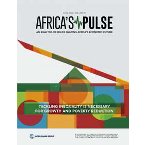![]() There are signs of a fragile economic recovery in Sub-Saharan Africa. After bottoming out at 2.6% in 2023, economic growth is expected to reach 3.4% in 2024 and 3.8% in 2025. The recovery is primarily driven by private consumption growth as declining inflation boosts the purchasing power of household incomes.
There are signs of a fragile economic recovery in Sub-Saharan Africa. After bottoming out at 2.6% in 2023, economic growth is expected to reach 3.4% in 2024 and 3.8% in 2025. The recovery is primarily driven by private consumption growth as declining inflation boosts the purchasing power of household incomes.
Inflation is cooling in most Sub-Saharan African economies but remains high compared to pre-pandemic levels. The median inflation in the region is projected to fall from 7.1% in 2023 to 5.1% in 2024 and 5% in 2025–26.
The risk of debt distress remains high with more than half of countries facing unsustainable debt burdens. In 2023, governments in the region spent over 45% of their revenues on debt repayments and interests, up from 31 % in 2022.
The impact of an uncertain global environment is compounded by increased fragility, conflict, and the impacts of climate change. As a result, an estimated 105 million people in the region were potentially experiencing severe food insecurity as of March 2024.
The pace of economic expansion in the region remains below the growth rate of the previous decade (2000-2014) and is insufficient to have a significant effect on poverty reduction. Moreover, economic growth reduces poverty in Sub-Saharan Africa less than in other regions. Per capita GDP growth of 1% is associated with a drop in the extreme poverty rate of only 1% in the region, compared to 2.5% in the rest of the world.
African governments must tackle structural inequality to foster stronger and more equitable growth, by restoring macro-economic stability, promoting inter-generational mobility, supporting market access, and ensuring that fiscal policies do not overburden the poor. The international community can also play a role by providing more concessional financing to facilitate the implementation of structural reforms and supporting external debt management.




